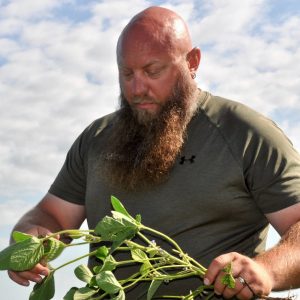Submitted by: Lorie Smith, Georgian Central Regional Communication Coordinator
Have you acquired any new skills lately? At Grey Bruce Farmers’ Week Crops Day, Dr. Lee Briese* Agronomist with Centrol Ag Consulting in North Dakota, challenged the virtual audience to assess their farm fields and develop new skills in the areas of soil health and crop management.
Briese shared his recent mastery of the yo-yo, equating many of the steps that he has taken to build his yo-yo skill set to those needed to better manage soil health. Skill building is key to both initiatives, and you need to start with learning the basics. Just like every skill, the only way to improve is to practice and commit to making it work. Briese warned the audience not to expect to be able to do all the yo-yo tricks in the first five minutes, nor should they expect the soil health tools to come easily either. As you hone your skills, you may read books, watch YouTube videos, or talk to a neighbour. Those resources will assist you, but Briese is not a fan of “one size fits all” approaches. He stressed that it is important to figure out these skills on your own, and customize the solutions that work for you, your farm, and your acres. You also need to prepare a set of “Plan Bs” in advance for when things go wrong, and then learn tricks to gain control of the situation. Remember that it is not the yo-yo that makes the player, it is the player that makes the yo-yo. Briese urged farmers to make the skills adapt to their farm instead of adapting their farm practices to the soil health skills. Producers should utilize the tools that are common and make sense to them in their efforts to make significant improvements to their farm soils, crops, and bottom line!
Detrimental changes in your farm productivity can sneak up on you, so Briese urged producers to take a drive and critically evaluate issues across their fields. Look for areas of soil loss, weed pressure, drainage issues, lack of productivity, etc. Next, producers should set goals for the future. He states that “at the end of the day, farmers need to be profitable—each acre needs to pay, so they should implement a system, and a set of tools, that will make that goal a reality.”
Once you have attempted some of your soil health strategies, or yo-yo tricks, you need to evaluate your progress. Are you achieving your goals? Measuring your adaptations regularly helps you assess if you are moving in the right direction with your tools of choice. It is easy to determine if you have mastered the Eiffel Tower yo-yo trick, but soil changes are slow-paced and difficult to measure accurately. Briese suggested that your shovel might be the best monitor of your success, rather than extensive soil testing. Feel how the shovel moves into the soil, find your compaction layers, evaluate moisture levels, look for soil aggregates/texture/good tilth, and notice the good smells of happy soil.
Briese peppered his presentation with some possible tools for consideration:
- Unproductive areas in a field? Plant a different crop there (i.e. barley in soy or corn). This might be more difficult for the farmer – different management, timing, and inputs, but the increased profit is a significant gain for the system. “Find the right job for those acres,” says
- Use residue management for weed control and to combat erosion. Direct seed into corn residue.
- Use cover crops as part of a weed management Briese has had good luck planting green into cereal rye.
- Increase diversity of root types to improve soil health. Aim to have the 5 food groups in each system – 1 cold season crop, 1 warm season crop, 1 warm season broadleaf, 1 warm season grass, 1
- Cropping Scenario Example 1: soybeans; corn followed by cereal rye/radish cover crop; spring wheat followed by peas/radish/oats cover crop.
- Cropping Scenario Example 2: wheat followed by cereal rye cover crop; soybeans; field peas followed by oats/ radish/flax cover crop; corn followed by cereal rye cover
Are you eager to sharpen your soil health/crop management skills? For more soil health tricks, you can follow Dr. Briese on Twitter: https://twitter.com/Lee_Briese
*Dr. Lee Briese’s speaker fees were covered by an OSCIA Tier One grant.
